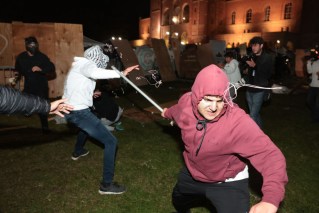Xenophobia is Dictionary.com’s word of the year

Lookups surged 938 per cent on the day of the Brexit vote in June. Photo: Getty.
You might have recently thought about it, heard it, or even felt it — Dictionary.com’s word of the year is “xenophobia”.
While it is difficult to get at exactly why people look up words in dictionaries, online or on paper, it is clear that in contentious 2016, fear of “otherness” bruised the collective consciousness around the globe.
The Brexit vote, police violence against people of colour, Syria’s refugee crisis, transsexual rights and the US presidential race were among prominent developments that drove debate and spikes in lookups of the word, said Jane Solomon, one of the dictionary site’s lexicographers.
The 21-year-old site defines xenophobia as “fear or hatred of foreigners, people from different cultures, or strangers”.
And Ms Solomon said it plans to expand its entry to include fear or dislike of “customs, dress and cultures of people with backgrounds different from our own”.
The word did not enter the English language until the late 1800s, she said.
Its roots are in two Greek words — “xenos” meaning “stranger or guest” and “phobos” meaning “fear or panic”.
The interest was clear on June 24, the day of Brexit, when the UK voted to leave the European Union.
Searches for xenophobia on the site increased by 938 per cent from June 22 to June 24, Ms Solomon said.
Lookups spiked again that month after President Obama’s June 29 speech in which he insisted that Donald Trump’s campaign rhetoric was not a measure of “populism,” but rather “nativism, or xenophobia, or worse”.
Ms Solomon added that chatter about xenophobia goes well beyond the spikes.
“It has been significant throughout the year,” she said.
“But after the EU referendum, hundreds and hundreds of users were looking up the term every hour.”
The word and the sentiment reflect a broader mournful tone to 2016, with Oxford dictionary editors choosing “post-truth” as their word of the year, often described in terms of politics as belonging to a time in which truth has become irrelevant.
“I wish we could have chosen a word like unicorns,” Ms Solomon said.








